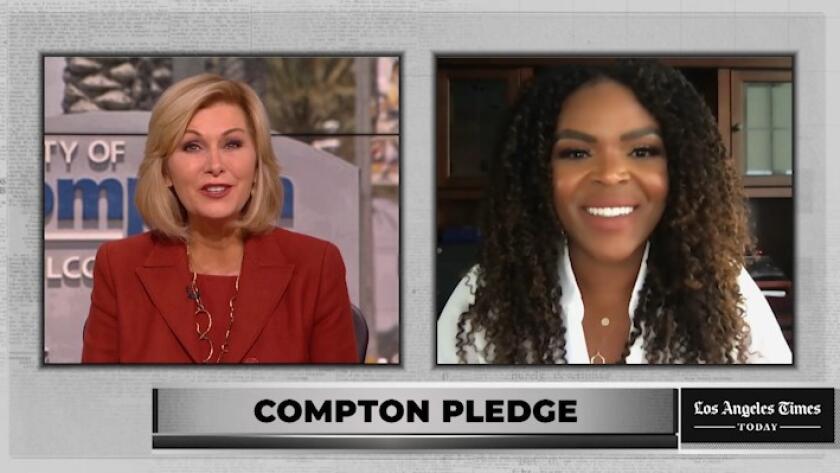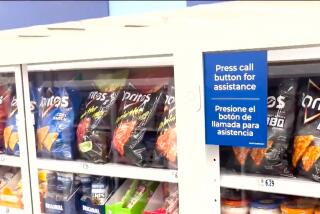800 Compton residents to get guaranteed income in two-year pilot program

Jacqueline Andrade and her husband both lost their jobs in March, at a point during the pandemic when grocery store shelves were being ransacked and government aid seemed far off.
She was running low on groceries for her family, and formula and diapers for her 3-month-old son. She seriously contemplated having to make diapers out of cloth, and scrambling for ways to feed her hungry baby.
“It was something I never thought I would have to face,” the 37-year-old Compton mother said. “We were unprepared for this.”
With the help of her children’s school, KIPP SoCal, and nonprofit One Family Los Angeles, she got access to a one-time $500 payment. It was a lifesaver that helped her cover basic needs in a moment of desperation. But it’s not the same as a steady paycheck. That kind of help, she said, “would be a stress reliever for our community.”
It is people like Andrade whom a new guaranteed income pilot program is trying to reach, Compton Mayor Aja Brown said. Later this year, the mayor says, the Compton Pledge will begin giving 800 Compton residents free cash for a two-year period. Brown said she thinks the program will have the greatest number of participants in a single U.S. city.
“I recognized that there’s a need for additional income, especially with the pandemic resulting in record high numbers of unemployment throughout the entire country,” the mayor said. “This is a great opportunity to address inequalities for Black and brown people and also additional opportunities for upward mobility.”
So far, private donors have contributed $2.5 million to the Fund for Guaranteed Income, a charity headed by Nika Soon-Shiong, daughter of Los Angeles Times owner Patrick Soon-Shiong.
Nika Soon-Shiong is also a co-director of the Compton Pledge. Funds will be administered by the city’s Compton Community Development Corporation.
Each selected family will receive at least a few hundred dollars on a recurring basis, as well as tools that will help them access financial guidance, Brown said. Parents or other residents caring for dependents may receive more. Anonymous researchers will track the participants’ spending and well-being.
The families will be randomly selected from a “pre-verified” group of low-income residents. A board made up of community organizations such as the Coalition for Humane Immigrant Rights and My Brother’s Keeper will advise the Compton Pledge on how to best reach marginalized communities.
The Compton Pledge has so far divulged little about the details, such as who donated to support the program, exactly how the participants will be selected, how much and how often recipients receive cash and what the research methods would be.
The Compton Pledge organizers want to maintain the integrity of the process, but ensure transparency once details are fleshed out, said Halah Ahmad, head of public relations and policy communications for the Jain Family Institute, a nonprofit research firm that helps design guaranteed income pilot programs.
The program will aim to include a representative sample of the 68% of Latino and 30% of Black residents in Compton, as well as those often excluded from federal and state aid programs, including undocumented immigrants and formerly incarcerated residents.
Ahmad said it remains to be seen whether a model that gives varying amounts of cash to needy residents will be effective and whether there are sustainable ways to fund a long-term guaranteed income program.
Brown said she had been aware of the concept of universal guaranteed income for years, but got to see it in action in February 2019 when Stockton Mayor Michael Tubbs launched the Stockton Economic Empowerment Demonstration, which gave 125 residents $500 a month for 18 months. In June 2020, Brown joined Tubbs as a founding member of the Mayors for a Guaranteed Income, a consortium of mayors working to launch more pilot programs in their cities. In July, Twitter CEO Jack Dorsey donated $3 million for the initiative.
By August, Brown began working with Compton Pledge partners to design its pilot program.
The concept of giving citizens free money with no strings attached was once a radical idea that has begun gaining traction, partly as a result of the pandemic. Opponents of guaranteed income have argued that extra cash with no strings attached would lead to higher levels of unemployment and that recipients might spend the money on drugs or alcohol or other “temptation goods.”
But decades of research has indicated that very few people work less after receiving cash transfers, and those who do use usually spend more with their families, Ahmad said. In a review of 19 studies on cash transfers between 1997 and 2014 by the World Bank, authors found that “Almost without exception, studies find either no significant impact or a significant negative impact of transfers on temptation goods.”
Brown said she hopes the impact of the cash transfers will ripple across her Compton community, beyond those who are selected for the pilot program. Having been raised by a single mother, she knows just how much it would mean.
“She worked really hard and focused on providing my brother and I the best quality of life she could,” Brown said. “I know firsthand that having a guaranteed income would have made a tremendous difference.”
Watch L.A. Times Today at 7 p.m. on Spectrum News 1 on Channel 1 or live stream on the Spectrum News App. Palos Verdes Peninsula and Orange County viewers can watch on Cox Systems on channel 99.
More to Read
Sign up for Essential California
The most important California stories and recommendations in your inbox every morning.
You may occasionally receive promotional content from the Los Angeles Times.











